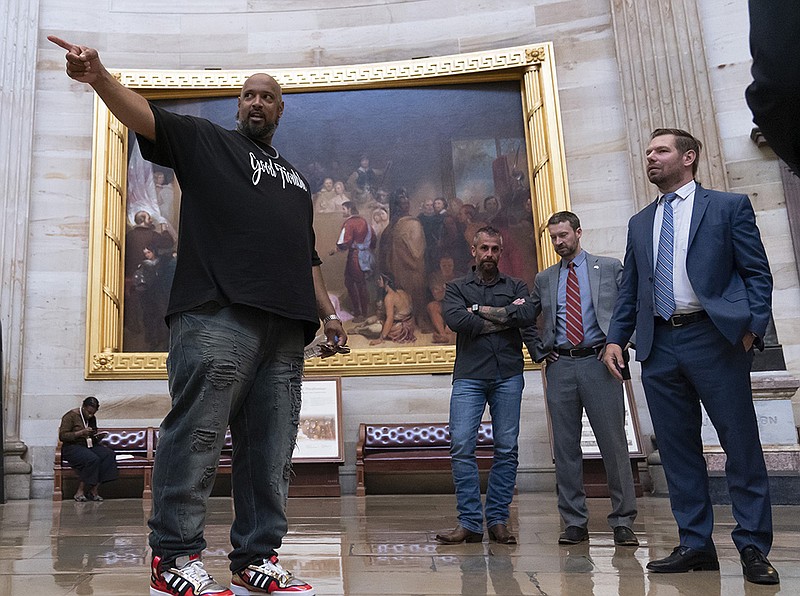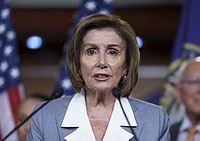WASHINGTON -- The House voted Wednesday to form a select committee to investigate the Jan. 6 attack on the Capitol, with nearly all Republicans opposing the legislation.
The vote was seen as a sign of the political challenges that face Democrats as they attempt to look into why thousands of supporters of former President Donald Trump swarmed the building and tried to stop the certification of the 2020 presidential election.
The 222-to-190 nearly party-line vote stands in contrast to a vote in May, when 35 House Republicans joined Democrats to back the creation of an independent commission to examine the root causes of the attack. While that group of House Republicans was willing to embrace an outside panel of experts evenly weighted between GOP and Democratic appointees, most indicated they were wary of a select committee that would be firmly in the control of House Speaker Nancy Pelosi's hand-picked participants.
Ahead of the vote, Pelosi told lawmakers in the chamber, "We will be judged by future generations as to how we value our democracy." She said she preferred that an independent panel lead the inquiry but Congress could wait no longer to begin a deeper look at the insurrection that was the worst attack on the Capitol in more than 200 years.
"It will find the truth -- which clearly the Republicans fear," she said during a speech Wednesday on the House floor.
[Video not showing up above? Click here to watch » https://www.youtube.com/watch?v=7Na7tnY7TUE]
The vote Wednesday was the latest example of how Republicans have rallied against scrutinizing an attack they once strongly condemned. Any investigation into the Jan. 6 attack would probably focus on the role played by Trump in inspiring the crowd that went to Washington that day in support of his claims that the election had been stolen.
The former president remains popular with Republican voters, and GOP leaders have been wary of doing anything that could draw his ire as they rely on him to motivate the party's base of voters ahead of the 2022 midterm elections. Several House Republicans skipped Wednesday's vote to join the former president at an event at the end of the border wall in Pharr, Texas, to assail the Biden administration's border policies.
Only two of the 211 House Republicans voted in favor of creating the panel -- Liz Cheney of Wyoming and Adam Kinzinger of Illinois, both of whom were among the 10 Republicans who voted to impeach Trump in January on charges he incited the attack.
In a statement, Cheney, who was ousted earlier this year from GOP leadership after criticizing Trump over his role in the Jan. 6 attack, called the panel "our only remaining option."
Most Republicans disagreed, though few came to the House floor to make statements defending their votes. Rep. Michael Burgess of Texas said he opposed what he called "one party investigating the other," and Ohio Rep. Brad Wenstrup rejected the new inquiry as "incomplete and insufficient" because it would not look into other incidents including the 2017 shooting at a baseball field that badly wounded GOP Rep. Steve Scalise of Louisiana.
[Gallery not loading above? Click here for more photos » arkansasonline.com/71pelosi/]
The other eight GOP lawmakers who had backed Trump's second impeachment voted against forming the select committee on Wednesday, despite all having voted in favor of an independent commission in May.
One of those eight members, Rep. Jaime Herrera Beutler, R-Wash., explained her opposition in a statement she posted to her Facebook page this week. It was "not good enough" to have a "partisan committee of politicians" investigate the events of the Jan. 6, she wrote, not least because its findings "will not be viewed as credible by at least half of Americans."
STATE'S DELEGATION
The four members of Arkansas' all-Republican House delegation opposed formation of a select committee, including two who had previously supported creation of a bipartisan investigation.
In a written statement, U.S. Rep. French Hill of Little Rock portrayed the select committee as flawed.
"If you wanted a true, bipartisan analysis on the security breach that threatened the Vice President and members of Congress, the bipartisan commission I voted in favor of in May would have been the way to achieve that," Hill said. "That commission would have had an even breakdown of Republicans and Democrats with subpoena power. Now, Democrats are moving forward with their partisan select committee. While based on prior select committees, Speaker Pelosi could technically veto appointments made by Republicans and all of the subpoena power is now in her hands."
In a written statement, U.S. Rep. Steve Womack of Rogers voiced similar concerns.
"The American people deserve a full and objective accounting of the January 6th assault. It's exactly why I voted for the bipartisan commission designed by Representatives John Katko and Bennie Thompson -- which was designed to be fair, transparent, and afford no side an advantage. Today's proposal overwhelmingly fails to meet those criteria," he said.
"Speaker Pelosi's version is blatantly partisan and skewed to give Democrats control over appointments, staff, and subpoena power," Womack said. "With her decided team at the helm of the investigation, I also have no confidence we'll receive a comprehensive rendering of the decisions out of the Speaker's office regarding actionable intelligence apparently ignored prior to the situation. Our responsibility is to find and present honest and credible facts, not implement an overtly partisan process."
PARTISAN HISTORY
Select committees are frequently relied upon to address pressing matters, but the high-profile ones also have a reputation for turning into forums for partisan mudslinging. A recent example is the GOP-led Select Committee on Benghazi, which was established in 2014 to investigate the attack on the U.S. Consulate in Benghazi, Libya, that left four Americans dead. It swiftly became a vehicle for excoriating former Secretary of State Hillary Clinton for using a private email server to conduct government business ahead of her 2016 run for president.
That panel had 12 members, five of whom were appointed by the Democratic minority. Pelosi designed the Jan. 6 select committee to have 13 members, five of whom would be appointed "after consultation with" Minority Leader Kevin McCarthy, R-Calif. That means Pelosi will be able to select eight of the panel members herself, including its chairman, and maintain the power to overrule McCarthy for picking anyone Democrats consider objectionable.
Pelosi has not announced whom she will appoint.
The chairman of the panel will wield power to subpoena witnesses and documents alone. Taking depositions would require the chair to consult with the most senior member of the minority appointees.
McCarthy has said nothing about his plans, or even if he will participate in its creation. All he has said publicly regarding the panel is that Pelosi "never talked to me about it."
Though he initially faulted Trump for inspiring the assault, McCarthy resisted early efforts to establish an outside panel to investigate it, arguing that Congress ought to cast a wider net -- to look into domestic extremism more broadly and scrutinize left-wing groups alongside the right-wing and white-nationalist organizations that organized and made up the Capitol riot.
McCarthy is facing pressure to take the investigation seriously from the police officers who responded to the attack. Dozens of officers suffered injuries that day as Trump's supporters fought past them and broke into the building.
One of the officers, Michael Fanone of Washington's Metropolitan Police, was in the House gallery during the vote and said he was angry at Republicans for voting against an investigation after he almost lost his life to protect them.
"I try not to take these things personally, but it's very personal for me," Fanone said.
At a meeting with McCarthy last week, Fanone said he asked McCarthy for a commitment not to put "the wrong people" on the panel, a reference to those in the GOP who have played down the violence and defended the insurrectionists.
Fanone said then that McCarthy told him he would take his request seriously. But the officer lashed out at the GOP leader after Wednesday's vote, saying he was trying to advance his political career "on the backs of hundreds of law enforcement officers that responded to defend the Capitol, himself included, from an insurrection."
House Republican leaders avoided discussing the committee on Wednesday; none spoke during floor debate on the legislation.
In recent months, Pelosi and her deputies began working around McCarthy, negotiating instead with Republicans more amenable to the idea of treating Jan. 6 as a subject worthy of special investigation, like the 9/11 terrorist attacks.
The failed bid to establish an independent commission was the product of a bipartisan agreement between the House Homeland Security Committee's top Democrat and Republican.
An aide to Pelosi this week indicated that she is considering appointing a Republican to the select committee as one of the eight picks she makes.
It is unclear when the panel's work will begin. While the House-approved independent commission would have been given until the end of 2021 to complete its probe, to avoid its findings having outsize influence on next year's midterm elections, there is no stated deadline in the bill the House approved Wednesday.
Information for this article was contributed by Karoun Demirjian and Marianna Sotomayor of The Washington Post; by Mary Clare Jalonick, Kevin Freking, Lisa Mascaro, Padmananda Rama and Jill Colvin of The Associated Press; and by Frank Lockwood of the Arkansas Democrat-Gazette.


